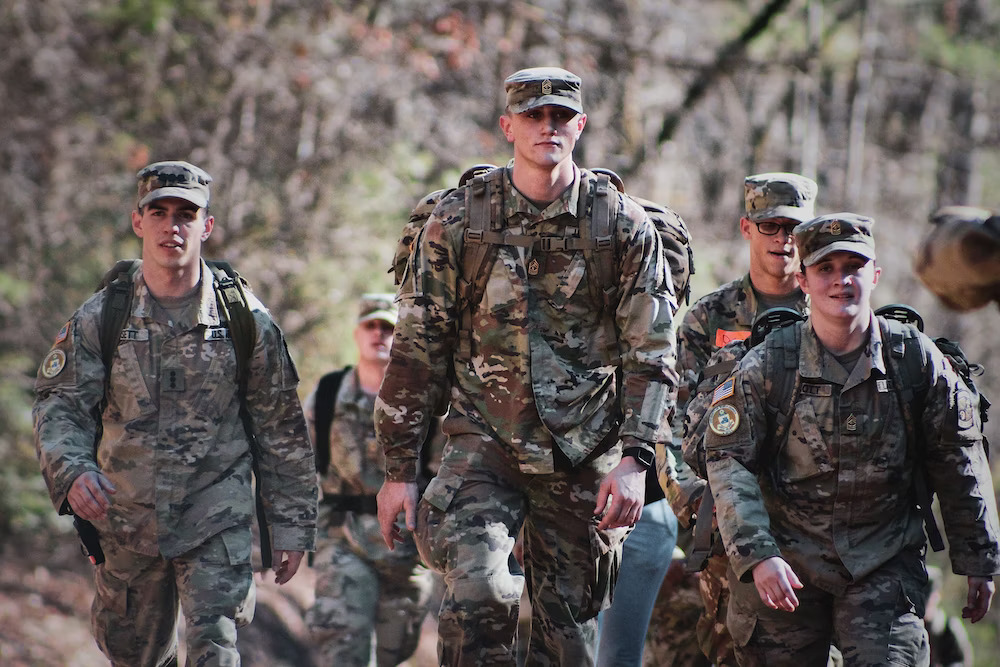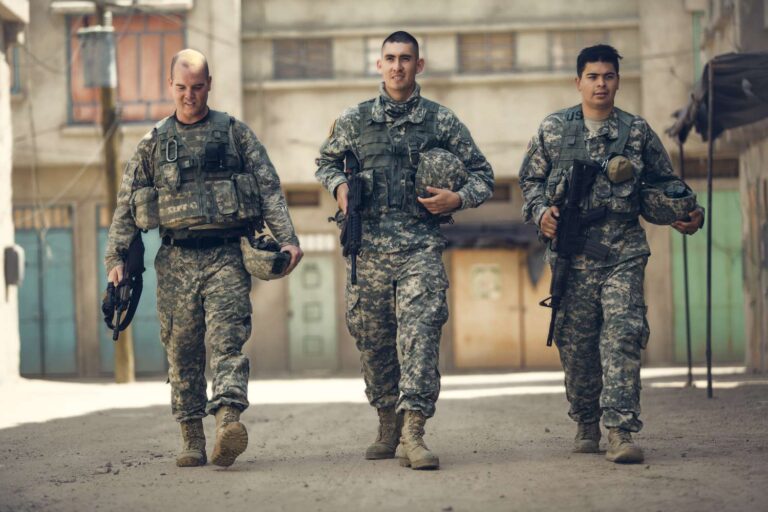Yes, in the UK, having a criminal record doesn’t always stop you from joining the Army. It depends on what you did. Some things might make it hard, but they look at each person’s situation individually.
They check your background through the Disclosure and Barring Service (DBS). Even if you made a mistake before, they think about whether you’ve changed and got better. Sometimes, people with past problems still get accepted into the Army.
This shows that they care about people improving and getting second chances. So, even if you made a mistake, there’s still a chance to be part of the Army if you’ve changed for the better.
What are the basic requirements to join the UK Army?

To join the UK Army, you need to meet certain basic requirements
Age
The typical age range for Army recruits is between 16 and 32 years old. However, certain roles may have specific age limits. Some roles might have a minimum age requirement, while others might have an upper age limit to ensure individuals can meet the physical demands of the job.
Health and Fitness
Good physical and mental health is crucial. During the recruitment process, candidates undergo a medical examination to assess their overall fitness and health. The Army needs individuals who can endure the physical demands of training and service.
Nationality
Eligibility is often limited to British citizens, Commonwealth citizens, or citizens of European Union (EU) or European Economic Area (EEA) countries. However, specific roles may have additional nationality requirements or restrictions.
Criminal Record
While a criminal record may pose challenges, the Army evaluates candidates on an individual basis. Some convictions may lead to disqualification, but in certain cases, waivers are granted based on the nature of the offense and the individual’s circumstances. The Army aims to provide second chances, recognizing rehabilitation efforts.
Educational Qualifications
Each role may have different educational requirements, ranging from basic standards to specific qualifications. Some roles may require certain academic achievements or vocational qualifications. It’s important to check the educational prerequisites for the particular role you’re interested in.
How does a criminal record affect eligibility for joining the UK Army?
A criminal record can impact eligibility for joining the UK Army, but the severity and nature of the offenses are crucial factors. Here’s how it generally works:
Evaluation on a Case-by-Case Basis
The Army assesses candidates individually, considering the specific details of their criminal record. Some offenses may lead to automatic disqualification, while others might be subject to further review.
Nature of Offenses
Serious or violent offenses may significantly affect eligibility. Offenses related to dishonesty or drug abuse could also raise concerns. However, less severe offenses may be more leniently considered.
Rehabilitation and Character References
The Army places importance on rehabilitation efforts. Candidates demonstrating positive changes and efforts to lead a law-abiding life may be viewed more favorably. Providing character references can support your case.
Disclosure and Barring Service (DBS) Check
As part of the recruitment process, a background check is conducted through the Disclosure and Barring Service. This check reveals details of your criminal record, helping the Army make informed decisions.
Waivers in Some Cases
In certain situations, the Army may grant waivers for specific offenses. This involves considering the circumstances surrounding the offense and the individual’s rehabilitation efforts.
What is involved in a UK military criminal record check?

In the UK, a military criminal record check is conducted as part of the recruitment process, and it involves several steps:
Application Process
When applying to join the UK military, candidates go through a thorough application process. This involves submitting personal information, educational background, and details about any criminal history through a security questionnaire.
Disclosure and Barring Service (DBS) Check
The DBS is a government service responsible for conducting criminal record checks. As part of the military application process, the candidate’s information is submitted to the DBS, which then conducts a comprehensive check of criminal records.
Biographical and Personal Details
The accuracy of the criminal record check depends on the completeness and accuracy of the biographical and personal details provided by the candidate. Full legal name, date of birth, and address history are critical components.
Identity Verification
To ensure that the criminal record check corresponds to the correct individual, there is a thorough identity verification process. This may involve presenting identification documents and confirming details provided in the application.
Results and Disclosure
The DBS check results include information about any convictions, cautions, reprimands, or warnings on record. This disclosure is then shared with the military authorities overseeing the recruitment process.
Assessment of Eligibility
The military authorities assess the disclosed criminal record information in the context of the candidate’s overall application. The severity and nature of the offenses, as well as any rehabilitation efforts, are considered when determining eligibility for military service.
Candidate Transparency
Throughout this process, honesty and transparency on the part of the candidate are crucial. Providing accurate information about any criminal history, no matter how minor, is essential for maintaining the integrity of the application process.
Are there exceptions or waivers for joining the UK Army with a criminal record?”
Yes, the UK Army does consider exceptions or waivers for individuals with a criminal record. The process involves a case-by-case assessment, taking into account various factors:
Nature and Severity of Offenses
The Army evaluates the nature and severity of the offenses committed. Some offenses may be considered more leniently than others, and certain minor convictions may not automatically disqualify an individual.
Individual Circumstances
Exceptions and waivers are often granted based on an individual’s specific circumstances. Factors such as the time elapsed since the offense, rehabilitation efforts, and evidence of positive changes in behavior are considered.
Rehabilitation Periods
The UK Army recognizes that people can change and rehabilitate. There are defined rehabilitation periods for certain offenses, and if a specific amount of time has passed without further legal issues, the Army may be more willing to consider an individual for service.
Character References
Providing character references can be beneficial. Letters of recommendation from employers, community leaders, or others who can attest to the individual’s character and rehabilitation efforts can support the case for an exception or waiver.
Case Review Process
Each case is reviewed individually, and decisions are made based on a holistic assessment. The goal is to ensure that individuals who have made positive changes and are committed to a law-abiding life are given fair consideration.
What disqualifies you from joining the Army UK?

Several factors can disqualify individuals from joining the UK Army. While eligibility is assessed on a case-by-case basis, common disqualifying factors include
Serious Criminal Offenses
Convictions for serious criminal offenses, such as violent crimes, sexual offenses, or certain drug-related offenses, may result in automatic disqualification.
Unspent Criminal Convictions
Unspent criminal convictions, particularly for offenses that are not considered minor, may disqualify individuals. The severity and nature of the offense play a crucial role in the assessment.
Recent Criminal Activity
Recent criminal activity or ongoing legal issues may affect eligibility. The Army typically seeks individuals with a demonstrated commitment to leading a law-abiding life.
Mental Health Conditions
Certain mental health conditions may disqualify individuals, especially if the condition is deemed incompatible with the demands of military service.
Physical Health Issues
Severe physical health issues that hinder a candidate’s ability to meet the physical demands of military training and service may disqualify them.
Drug Abuse and Dependency
Substance abuse issues, particularly drug dependency, can lead to disqualification. The Army places a premium on individuals who can maintain physical and mental fitness.
Lack of Required Educational Qualifications
Depending on the specific role, not meeting the necessary educational qualifications may disqualify individuals from certain positions.
Age Limitations
Age limitations apply to various roles in the Army. Being outside the specified age range for a particular role may disqualify an individual.
Nationality Restrictions
Certain roles may have specific nationality requirements, and not meeting these requirements can disqualify individuals from those roles.
Failure to Meet Fitness Standards
Inability to meet the Army’s fitness standards may impact eligibility, as physical fitness is crucial for successful completion of training and service.
FAQ
What do you need to join the Army UK?
To join the UK Army, you need to meet basic requirements like age (usually between 16 and 32), good health and fitness, British citizenship, or citizenship from Commonwealth or EU/EEA countries, a clean criminal record, and certain educational qualifications.
How do I go about joining the military?
To join the military, you typically start by contacting a recruitment office. They will guide you through the application process, which involves submitting personal details, completing medical examinations, and meeting specific eligibility criteria.
Is 25 too late to join the military?
No, 25 is not too late to join the military. Many armed forces accept recruits up to their early 30s, and each branch may have different age requirements for specific roles.
Is 35 too old to join Army?
While it depends on the specific military branch and role, 35 is often considered the upper age limit for enlisting in the Army. However, exceptions may exist based on individual circumstances and roles.
What age is too late to join the Army?
There isn’t a fixed age that is considered “too late” to join the Army. Eligibility depends on various factors, but many armed forces accept recruits up to their early 30s.
Can I join the US Army as a foreigner?
Yes, non-U.S. citizens can join the U.S. Army through the Military Accessions Vital to the National Interest (MAVNI) program. This program allows certain non-citizens with specific skills or language abilities to enlist.
Is 27 too old to join the Army?
No, 27 is not too old to join the Army. Many military branches accept recruits in their late 20s, and each branch may have different age requirements for specific roles.
What is the qualification for Army?
Army qualifications include meeting age requirements, being in good health and fitness, having the necessary educational qualifications, and demonstrating good character with a clean criminal record.
What is the minimum weight to join the Army?
The minimum weight requirement for joining the Army varies based on factors like height and age. It’s part of the overall assessment of physical fitness during the recruitment process.
How much body fat is allowed in the Army?
Body fat standards in the Army are based on gender and age. The maximum allowable body fat percentage depends on factors like physical fitness and overall health.
How long is Army basic training?
The duration of Army basic training varies but is typically around 8 to 12 weeks. The length may depend on the specific branch of the Army and the role for which you are training.
Final words
You can join the Army in the UK even if you have a criminal record. It depends on what you did and if you’ve changed. Each person is looked at individually, considering the type of crime and if you’ve made positive changes.
While serious crimes might make it harder, they still give second chances. Being honest about your past and showing you’ve tried to do better are important. If you really want to join, don’t give up. Just be open about your situation, and it’s a good idea to talk to the recruitment office for help and advice.

